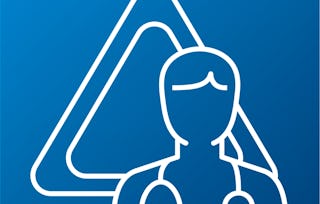This course introduces learners to the foundational concept of health and its critical role in shaping human life and societal well-being. It explores the interconnections between life, health, and healthcare systems, offering a multidimensional understanding of what it means to be healthy. The module examines various theoretical approaches to health, including the biomedical model, health as human capital, Amartya Sen’s capability approach, and the framing of health as a fundamental human right. Through these perspectives, learners will gain insight into how health is understood, measured, and promoted in policy and practice, and its centrality to sustainable development and human dignity.

Gain next-level skills with Coursera Plus for $199 (regularly $399). Save now.

Recommended experience
What you'll learn
Understand the relationship between health and healthcare systems, and analyze health as human capital, capability, and fundamental human right.
Skills you'll gain
Details to know

Add to your LinkedIn profile
September 2025
26 assignments
See how employees at top companies are mastering in-demand skills

There are 7 modules in this course
In this module, you will be introduced to the concept of health. You will also explore the relationship between life, health, and healthcare. This module will also cover various approaches to health, such as the biomedical approach, health as a human capital, the capability approach to health, and health as a human right.
What's included
9 videos4 readings4 assignments
You will explore various concepts and definitions related to health, diseases, mortality, and morbidity in this module. You will learn about some key ideas related to disease dynamics that would elaborate the broad trajectory of transitions in human health and life. You will also be able to explore various data related to health achievement and its relationship with economic development. You will analyze the case of mortality decline in the UK during the late 19th and early 20th centuries to understand the role of medical technologies and economic development in improving human health.
What's included
9 videos4 readings4 assignments
In this module, you will explore the public health approach. Starting with John Snow’s experiment, you will be able to appreciate the key principles of the public health approach, which is ingrained in the social sciences, arts, and sciences. Further, you will examine the public health approach adopted during COVID-19 around the world. Subsequently, you will learn why health is socially determined and the basic contours of the SDH framework, with special emphasis on the role of power. The module discusses some key social determinants of health: gender, work, food and nutrition, and climate change.
What's included
9 videos4 readings4 assignments
In this module, you will be introduced to the contours of health economics. You will also be able to appraise them using the analytical frameworks, tools, and techniques offered by health economics that help in dealing with problems of health and healthcare delivery. You will investigate market failures in health and healthcare, as well as the role of government in addressing these failures. You will also learn about the ideas of public goods and merit goods in the context of healthcare. Lastly, you will be introduced to the basics of economic evaluation methods for health and their critiques.
What's included
7 videos5 readings4 assignments
In this module, you will gain an understanding of the basic definition of health systems and their goals and outcomes, with particular attention to the idea of equity. This module will also review the ‘intermediate outcomes’ to explore how improving access, efficiency, and quality will improve the effective availability of services. You will also gain insight into how these contribute to the ultimate goals of improving people’s health, financial protection, and satisfaction with their healthcare.
What's included
8 videos3 readings3 assignments
This module will introduce you to various aspects of healthcare financing. You will gain an understanding of different forms of health financing. You will also learn about the roles of agents, including those of states, markets, and individuals. In this module, the major emphasis will be given to out-of-pocket spending on health and its impact on equality and access. You will also understand healthcare and financing systems from a historical perspective, with special emphasis on developing countries.
What's included
7 videos3 readings3 assignments
In this module, you will be introduced to universal health coverage (UHC). You will further explore using the theory of change (ToC) framework to analyze the design of the health system to achieve UHC. This module will also discuss the challenges developing countries face in achieving UHC.
What's included
9 videos5 readings4 assignments
Build toward a degree
This course is part of the following degree program(s) offered by O.P. Jindal Global University. If you are admitted and enroll, your completed coursework may count toward your degree learning and your progress can transfer with you.¹
Instructor

Offered by
Explore more from Public Health
 Status: Free Trial
Status: Free TrialImperial College London
 Status: Preview
Status: PreviewThe University of Tokyo
 Status: Free Trial
Status: Free TrialJohns Hopkins University
 Status: Free Trial
Status: Free TrialImperial College London
Why people choose Coursera for their career





Open new doors with Coursera Plus
Unlimited access to 10,000+ world-class courses, hands-on projects, and job-ready certificate programs - all included in your subscription
Advance your career with an online degree
Earn a degree from world-class universities - 100% online
Join over 3,400 global companies that choose Coursera for Business
Upskill your employees to excel in the digital economy
Frequently asked questions
To access the course materials, assignments and to earn a Certificate, you will need to purchase the Certificate experience when you enroll in a course. You can try a Free Trial instead, or apply for Financial Aid. The course may offer 'Full Course, No Certificate' instead. This option lets you see all course materials, submit required assessments, and get a final grade. This also means that you will not be able to purchase a Certificate experience.
When you purchase a Certificate you get access to all course materials, including graded assignments. Upon completing the course, your electronic Certificate will be added to your Accomplishments page - from there, you can print your Certificate or add it to your LinkedIn profile.
Yes. In select learning programs, you can apply for financial aid or a scholarship if you can’t afford the enrollment fee. If fin aid or scholarship is available for your learning program selection, you’ll find a link to apply on the description page.
More questions
Financial aid available,

